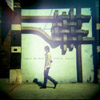 The world of "electronica" arguably moves quicker than any other genre of modern music. Subgenres like trip-hop, drum n bass, grime, dubstep, IDM, are just as quickly dismissed as they are embraced. When an album like this comes along (which avoids all subgenre pigeonholing) it can easily be passed over by critical purists, but, in the long run, this characteristic can make it have an exponentially longer shelf life. Fourteen months after its release I am still—actually even more—addicted to it. This is one of my favorite albums of 2009 and possibly one of my favorite electronic albums of the last decade.
The world of "electronica" arguably moves quicker than any other genre of modern music. Subgenres like trip-hop, drum n bass, grime, dubstep, IDM, are just as quickly dismissed as they are embraced. When an album like this comes along (which avoids all subgenre pigeonholing) it can easily be passed over by critical purists, but, in the long run, this characteristic can make it have an exponentially longer shelf life. Fourteen months after its release I am still—actually even more—addicted to it. This is one of my favorite albums of 2009 and possibly one of my favorite electronic albums of the last decade.
Immolate Yourself bears a very strange title given the turn of events around its release. One way to define "to immolate" is "to sacrifice," and one week before the album's street date, Charlie Cooper, 1/2 of the group, took his own life. I wouldn't go as far as to say we were friends but I had met him and Josh a few times, interviewed them once for The Eye, and had some occasional emails with them from time to time. Charlie was indeed a sweetheart and will sorely be missed.
While the duo's work relies heavily on machinery and technology, this album aches with humanity. Following some of the blueprints laid by Kraftwerk, the almost clinical quantization of beats and sequenced melodies is equally as important as the lush soundscapes, anthemic motifs, and subtle—yet never downplayed nor discounted—singing. When an electronic outfit debuts with an instrumental sound and progresses into a project with vocals, there's a tendency to ruin records by making them too voice heavy, with mediocre vocal performances front and center (see UNKLE and Dntel). Thankfully, the vocals on Immolate Yourself only appear on songs where they belong, are never overbearing, nor do they provide an excuse for lackluster instrumentation on the songs they do appear. There's almost a scent of the more experimental pop stage of OMD in the air: recall the 1981 hit single "Joan of Arc" - a pop tune absent of a vocal refrain, using a melody line in its place.
I admire that the duo has spent a noticeably long time on the quality of this record rather than flood the market with quantity. It's fairly clear that lots of time was dedicated to both the composition and recording of the album. Their songwriting on this album is intricate, managing to accomplish both unpredictable originality and catchiness. I often find myself stuck with the opener "The Birds" and the closing title track, the second single, stuck in my head. A song like "Your Mouth" will cause wet dreams for studio heads due to its classy blend of well-treated sounds and instrumentation, including the sound of what could easily be the band physically grabbing an actual reel-to-reel tape of lush strings with their hand, at very carefully planned moments, to make that almost unrepeatable instantaneous sound of cassettes being munched. While this could very well be an effect of some piece of software, to me the point seems clear: while machines are responsible for a lot of the sounds here, man is still in control.
Immolate Yourself is the perfect length at 45 minutes, consisting of only 10 songs and zero filler: from start to finish, there is not a weak moment to be found. The closest the duo approaches is the instrumental "Your Every Idol," which is based on a drum loop that creeps out of phase predominantly in one channel and eventually catches up with itself, morphs into more of a metallic machine sound, and evolves to form the backbone of "You Are the Worst Thing In the World," the first single release from the album, and a song delicious enough to make any Camouflage fan very, very happy.
The departure of any member of a group will undoubtedly change the sound, but the sound of Telefon Tel Aviv has changed over the course of their output over the last decade, and would have evolved again. This is such a complex record that it's exceptionally sad Charlie left us before he could see the impact his devotion to this recording had upon its release and may continue to have over the years. This is one hell of a record and to be able to listen to it and grow more fond of it long after its release is a testament to its excellence.
samples:
Read More

